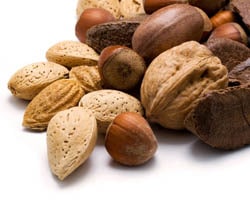
Fat gets a bad rap, and it's mostly undeserved. The bad reputation started in the ’70s and ’80s, when the predominant belief claimed that fat was harmful and too much fat jeopardizes health. The truth is that not all fat is bad, and in fact, many types of fats are important-especially during pregnancy.
Fats can help to nourish a developing brain, build the immune system, and synthesize vital hormones. They are a key macronutrient the body needs in order to develop properly.
Understanding the role and importance of fats is central to sustaining a healthy pregnancy for they are crucial for both baby and mommy’s health. Both women and growing fetuses need a steady supply of fats. If fats are not abundantly present, the growing fetus will take precedence and the mother will end up with deficiencies that can lead to serious health problems, which include postpartum depression, compromised immunity, and insufficient breast milk production. Thus, sufficient intake is paramount in protecting the health of both individuals.
Cholesterol
Food sources: Meat, seafood, eggs, dairy
Out of all the available fats, cholesterol is often the most misunderstood. Due to health warnings from doctors and the media, most people automatically assume cholesterol should be limited or eliminated from the diet. This is not true-especially during pregnancy and breastfeeding. Cholesterol has many purposes in the body that relate to brain health, hormone production, and nerve protection. According to Sally Fallon of the Westin Price Foundation, cholesterol is critical for the development of the brain and nervous system of both a fetus and infant, which is why breast milk contains such high amounts of it.
A study published in Pediatrics in October 2007 also showed that mothers with low levels of cholesterol were more likely to deliver preterm babies. More research is currently being done to determine more of the health effects of too little cholesterol during pregnancy.
Interesting Fact: Too little cholesterol is as much a problem as too much. Individuals with too little cholesterol can experience mood disorders, low vitamin D levels, endocrine issues, and can even lead to early death.
Omega 3s
Food sources: Some fish (wild salmon, herring, sardines, mackerel), walnuts, flax seed oil, hemp seed oil
Omega 3s are a type of essential fatty acid all pregnant women should consume due to their many health promoting benefits. Among other things, Omega 3s and their breakdown components of DHA and EPA assist with proper development of the brain and eyes. Studies have also shown that consuming fish oil during pregnancy helps to reduce pre-term delivery of babies.
An additional benefit of consuming DHA is its positive affect on reducing postpartum depression. Current research is showing that women who are low in DHA may be predisposed to postpartum depression. According to the Centers for Disease Control (CDC), approximately 12 to 15 percent of women who give birth in the United States develop postpartum depression.
Saturated Fats
Food sources: meat, dairy, eggs, coconut oil
Saturated fats are another type of fat that is often grouped in the “avoid” category. However, these fats are not as bad for pregnancy as often portrayed to be. Because pregnancy facilitates the building of organs and tissues that require a lot of fatty acids, fat-including saturated fat-is important in the diet. Some of the functions of saturated fats include the formation of cell walls, immune enhancement, help with the absorption of EFAs, and they even have antimicrobial properties.
With this category of fat, the main consideration is the quality of the source and how much. Therefore, consuming organic or naturally raised meats, eggs and dairy (with some fat) as well as coconut oil, in balance with other fats, is part of a healthy diet.
Monounsaturated Fats
Food sources: Olive oil, nuts and seeds, avocados
Monounsaturated fats should also be included in the pregnant mother’s diet in foods such as nuts, avocados, olives, and olive oil. These fats can help reduce inflammation, protect the heart, and help support the development of fatty tissue in the body.
Fats to Avoid
Trans fats are in a category of their own when it comes to health. These man-made fats pose real threats to individuals consuming them, an this is especially true during pregnancy. Trans fats cross the placenta and reach a growing fetus, potentially causing future damage such as insulin resistance, lowered metabolism, and obesity, among other things.
Trans fats should be avoided at all costs. They are found in shortening, margarine, chips, and baked goods such as cookies, doughnuts, cakes, and crackers.










